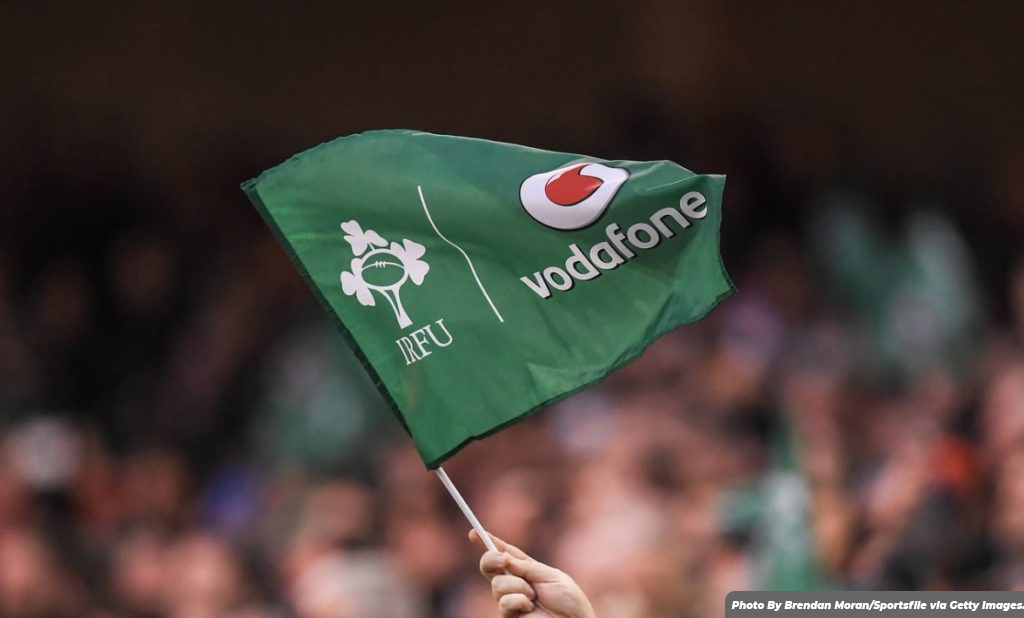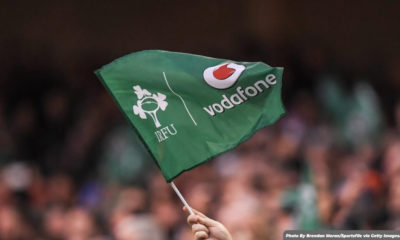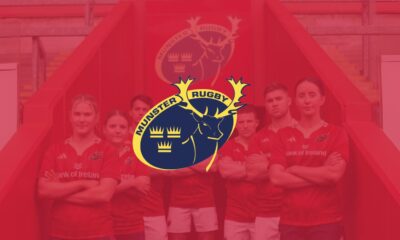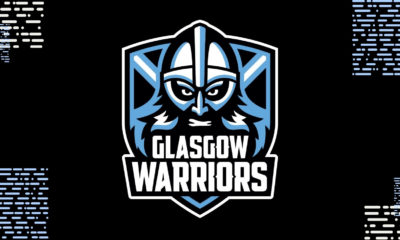6 Nations
IRFU Announces National Talent Squad Inductees for 2022/23 Season

The 85 players selected to the IRFU’s National Talent Squad (NTS) programme, supported by Pwc, for the 2022/23 season have been confirmed with a strong spread of talent across the four provinces from established and emerging rugby environments.
The NTS programme has been in existence since 2016 and its purpose is to identify, develop and support players who have the potential, ability, and drive to play professional rugby within Ireland. The aim of the programme is to accelerate the development of young players of national interest between the ages of 16-21. The services provided prepare players to perform within the provincial and national pathways and the transition to the senior professional game.
Recent NTS graduates have been capped at senior international level for Ireland – Ryan Baird, Craig Casey, James Hume, Michael Lowry and Tom O’Toole.

2022 Toyota Challenge, Emerging Ireland celebrate win over Currie Cup side the Griquas in their opening game in Bloemfontein, South Africa
While others like Thomas Ahern, Thomas Clarkson, Jack Crowley, Nathan Doak, Cathal Forde, Michael Milne, Stewart Moore, David McCann, Ethan McIlroy, Ben Murphy, Jamie Osborne, Scott Penny, Andrew Smith and Tom Stewart all featured for the Emerging Ireland squad that competed in the Toyota Challenge in Bloemfontein over the past couple of weeks.
National Talent Squad Level 1 (Players who have left Secondary School)
| Fiachna Barrett (Corinthians RFC) Sam Berman (Dublin University FC) Jack Boal (QUB RFC) Joe Charles (Ballynahinch RFC) David Colbert (Dublin University FC) Hugh Cooney (Clontarf FC) Josh Costello (Shannon RFC) Adam Deay (Lansdowne FC) Cameron Doak (Belfast Harlequins RFC) James Doyle (Lansdowne FC) Sean Edogbo (UCC RFC) Sean Fox (Corinthians RFC) Brian Gleeson (Garryowen FC) Ethan Graham (Ballynahinch RFC) |
Fintan Gunne (Terenure RFC) George Hadden (Clontarf FC) Charlie Irvine (QUB RFC) Stephen Kiely (Old Crescent RFC) Mark Lee (Rainey Old Boys RFC) Gus McCarthy (UCD RFC) Patrick McCarthy (Dublin University FC) Henry McErlean (Terenure College RFC) Liam Molony (Dublin University FC) Ruben Moloney (UCD RFC) Ihechi Oji (UL Bohemians RFC) Andrew Osborne (Naas RFC) Conor O’Tighernaigh (UCD RFC) Danny Sheahan (UCC RFC) Jacob Sheahan (UCC RFC) |
National Talent Squad Level 2 (Players in final year of Secondary School)
| David Armstrong (Methodist College) Ambrose Bamber (Sligo RFC/Sligo Grammar) Jacob Boyd (RBAI) Tadhg Brophy (Newbridge College) Emmett Calvey (Ard Scoil Ris) Oliver Coffey (Blackrock College) Rory Ellerby (RBAI) Tom Farthing (Corinthians RFC/Colaiste Chroi Mhuire) Paidi Farrell (Tullamore RFC/St Mary’s Edenderry) Jules Fenelon (St Michael’s College) Mark Fitzgerald (Crescent College Comp) Max Flynn (Corinthians RFC/CC Roscrea) Caden Grant (Corinthians RFC/St Joseph’s College) Dylan Hicks (Bantry RFC/Colaiste Pobail) Lucas Kenny (Campbell College) Luke Kritzinger (Blackrock College) Tom Larke (Old Wesley RFC/St Columba’s College) Flynn Longstaff (Campbell College) Ben McFarlane (Methodist College) |
James McKillop (Foyle College) Hugo McLaughlin (Gonzaga College) Blayze Molloy (Ballina RFC/Clongowes) Alex Mullen (Blackrock College) Jack Murphy (Presentation College Bray) Luke Murphy (Ard Scoil Ris) Sean Naughton (Kilkenny College) Dawid Novak (CBC Cork) Kamil Novak (CBC Cork) Ben O’Connor (PBC Cork) Michael O’Donovan (Bantry RFC/Colaiste Pobail) Jed O’Dwyer (Crescent College Comp) Jake O’Riordan (St Munchines College) Stephen Smyth (Kilkenny College) Andrew Sparrow (St Mary’s College) Alan Spicer (Belvedere College) Josh Stevens (Methodist College) Alex Usanov (Belvedere College) Bryn Ward (RBAI) |
National Talent Squad Level 3 (Players with 2 or more years left in Secondary School)
| Cian Brady (Monivea RFC/Colaiste an Eachreidh) Connor Fahy (Wexford Wanderers RFC/Good Counsel) Michael Foy (CBC Cork) Sean Hopkins (Ballina RFC/St Muredach’s College) Jamie Jackson (Portadown College) Clarke Logan (Coleraine Grammar School) Charlie Molony (Blackrock College) Aaron O’Brien (St Mary’s College) Diarmuid O’Connell (Sligo RFC/Sligo Grammar) |
Gene O’Leary Kareem (PBC Cork) Mahon Ronan (Boyne RFC/St Marys Drogheda) Eoghan Smyth (Midleton RFC/Midleton College) Tom Stewart (St Michael’s College) Paddy Taylor (Newbridge College) Matt Te Pou (St Munchins College) Bryan Walsh (Corinthians RFC/Colaiste Einde) Adam Watchorn (Kilkenny College) Tom Wood (St Munchins College) |
Images & Content from Irish Rugby & Images © Inpho Photography
6 Nations
Munster Rugby Announce Contract Deals For Murray, Daly & Gleeson

Munster Rugby and the IRFU are pleased to confirm contract extensions for Conor Murray and Jack Daly with Brian Gleeson to be promoted from the Academy to the senior squad next season.
Murray and Daly have signed one-year extensions with Gleeson moving up to the senior squad on a two-year deal.
Gleeson is one of five Academy players moving up to the senior squad next year with Tony Butler, Ethan Coughlan, Mark Donnelly and Edwin Edogbo also signing two-year deals.
Conor Murray is one of the most decorated scrum-halfs in world rugby with 116 Ireland caps and three British & Irish Lions tours to his name.
A former St Munchin’s College student, the Garryowen man won his fifth 6 Nations title with Ireland last month and earned his second league title with Munster last season.
The 34-year-old has made 185 Munster appearances and scored 34 tries for the province to date and was named on World Rugby’s Team of the Decade in 2019.
25-year-old flanker Jack Daly came up through the ranks at Castleisland RFC and made his Munster debut against Zebre in 2020.
Daly joined the Academy in 2018, moved up to the senior squad in 2021 and plays his AIL rugby with Garryowen. A former Ireland U20 international, he made his Champions Cup debut against Toulouse in the quarter-final at the Aviva Stadium in 2022.

Try-scoring number 8 Brian Gleeson leads the charge for the Ireland Under-20s against France ©INPHO/Evan Treacy
20-year-old Gleeson moves up to the senior squad after just one year in the Academy that has seen him score one try in nine senior appearances.
Currently out of action with an ankle injury, he had already made three Champions Cup appearances before turning 20.
The powerful back-row forward was a Grand Slam winner with the Ireland U20s last year. plays his AIL rugby with Garryowen and came up through the ranks at Thurles RFC and Rockwell College.
Images & Content from Irish Rugby & Images © Inpho Photography
6 Nations
Farrell Names Ireland Match Day Squad To Face Scotland In Dublin

Head Coach Andy Farrell has named his Ireland Match Day Squad for Saturday’s Guinness Men’s Six Nations clash against Scotland at Aviva Stadium (Kick-off 4.45pm).
Ireland – currently sitting top of the Six Nations table heading into Super Saturday – can clinch back-to-back Championship titles with victory over Scotland in Dublin.
Farrell has named an unchanged starting XV for the Round 5 clash, as Hugo Keenan, Calvin Nash and James Lowe continue in the Ireland back three. Robbie Henshaw and Bundee Aki are once again selected in midfield, with Jack Crowley and Jamison Gibson-Park the starting half-backs.
Andrew Porter, Dan Sheehan and Tadhg Furlong pack down in the front row, with Joe McCarthy partnering Tadhg Beirne – who is set to win his 50th Test cap for Ireland – in the engine room.
Captain Peter O’Mahony is at blindside flanker, Josh van der Flier is at openside and Caelan Doris completes the starting XV at number eight.
The Ireland Coaching Team have opted for a 5-3 split on the bench, with Rónan Kelleher, Cian Healy, Finlay Bealham, Ryan Baird and Jack Conan providing the reinforcements up front, and Conor Murray, Harry Byrne and the fit-again Garry Ringrose the backline options.

Saturday’s match is live on Virgin Media One and ITV, with live radio coverage available on RTE Radio 1.
Ireland Team & Replacements (v Scotland, Guinness Men’s Six Nations, Saturday, March 16, 4.45pm)
15. Hugo Keenan (UCD/Leinster)(39)
14. Calvin Nash (Young Munster/Munster)(5)
13. Robbie Henshaw (Buccaneers/Leinster)(71)
12. Bundee Aki (Galwegians/Connacht)(55)
11. James Lowe (Leinster)(30)
10. Jack Crowley (Cork Constitution/Munster)(13)
9. Jamison Gibson-Park (Leinster)(34)
1. Andrew Porter (UCD/Leinster)(63)
2. Dan Sheehan (Lansdowne/Leinster)(25)
3. Tadhg Furlong (Clontarf/Leinster)(75)
4. Joe McCarthy (Dublin University/Leinster)(9)
5. Tadhg Beirne (Lansdowne/Munster)(49)
6. Peter O’Mahony (Cork Constitution/Munster)(captain)(104)
7. Josh van der Flier (UCD/Leinster)(61)
8. Caelan Doris (St Mary’s College/Leinster)(40)
Replacements:
16. Rónan Kelleher (Lansdowne/Leinster)(30)
17. Cian Healy (Clontarf/Leinster)(128)
18. Finlay Bealham (Buccaneers/Connacht)(39)
19. Ryan Baird (Dublin University/Leinster)(19)
20. Jack Conan (Old Belvedere/Leinster)(45)
21. Conor Murray (Garryowen/Munster)(115)
22. Harry Byrne (UCD/Leinster)(3)
23. Garry Ringrose (UCD/Leinster)(57).
Images & Content from Irish Rugby & Images © Inpho Photography
6 Nations
Farrell Names Ireland Team To Face England At Twickenham

Head Coach Andy Farrell has named his Ireland Match Day Squad for Saturday’s Guinness Men’s Six Nations clash against England at Twickenham (Kick-off 4.45pm).
Peter O’Mahony captains Ireland for the Round 4 visit to London, with Hugo Keenan returning to the starting XV after recovering from injury.
Keenan joins Calvin Nash and James Lowe in the Ireland back three, with Bundee Aki and Robbie Henshaw continuing their midfield partnership.
Jack Crowley and Jamison Gibson-Park are retained as the half-back pairing.
In the pack, Andrew Porter, Dan Sheehan and Tadhg Furlong are in the front row, with Joe McCarthy and Tadhg Beirne named in the engine room. Captain O’Mahony is at blindside flanker, Josh van der Flier is at openside and Caelan Doris completes the starting XV at number eight.
The Ireland Coaching Team have selected a 6-2 split on the bench, as Ronan Kelleher, Cian Healy, Finlay Bealham, Iain Henderson, Ryan Baird and Jack Conan provide the reinforcements in the pack.
Backs Conor Murray and Ciaran Frawley complete Ireland’s Match Day 23 to face England.
Saturday’s match is live on RTÉ2 and ITV.
Ireland:
15. Hugo Keenan (UCD/Leinster)(38)
14. Calvin Nash (Young Munster/Munster)(4)
13. Robbie Henshaw (Buccaneers/Leinster)(70)
12. Bundee Aki (Galwegians/Connacht)(54)
11. James Lowe (Leinster)(29)
10. Jack Crowley (Cork Constitution/Munster)(12)
9. Jamison Gibson-Park (Leinster)(33)
1. Andrew Porter (UCD/Leinster)(62)
2. Dan Sheehan (Lansdowne/Leinster)(24)
3. Tadhg Furlong (Clontarf/Leinster)(74)
4. Joe McCarthy (Dublin University/Leinster)(8)
5. Tadhg Beirne (Lansdowne/Munster)(48)
6. Peter O’Mahony (Cork Constitution/Munster)(captain)(103)
7. Josh van der Flier (UCD/Leinster)(60)
8. Caelan Doris (St Mary’s College/Leinster)(39)
Replacements:
16. Ronan Kelleher (Lansdowne/Leinster)(29)
17. Cian Healy (Clontarf/Leinster)(127)
18. Finlay Bealham (Buccaneers/Connacht)(38)
19. Iain Henderson (Academy/Ulster)(80)
20. Ryan Baird (Dublin University/Leinster)(18)
21. Jack Conan (Old Belvedere/Leinster)(44)
22. Conor Murray (Garryowen/Munster)(114)
23. Ciaran Frawley (UCD/Leinster)(3)
Images & Content from Irish Rugby & Images © Inpho Photography













